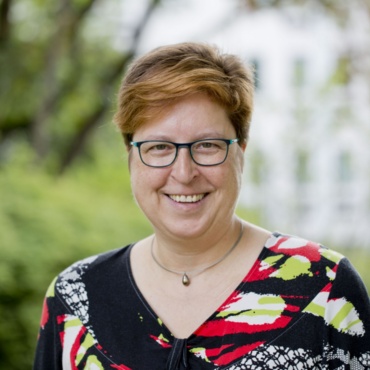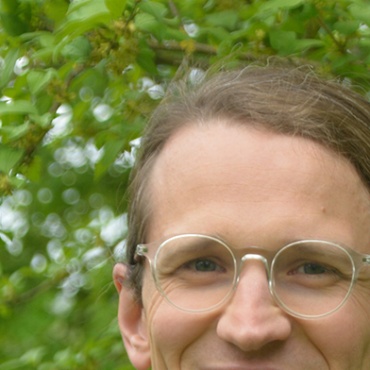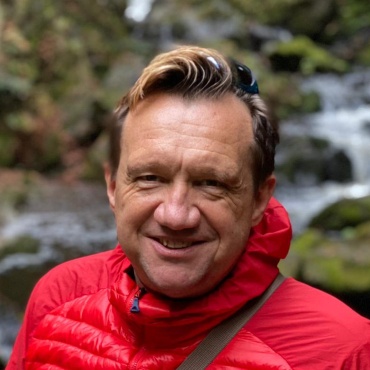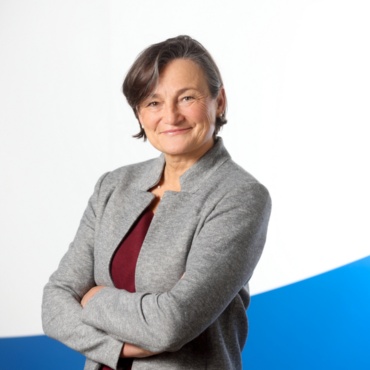Purple light up: We have virtually lit up the Student Services Center in purple. With the article on this page we are taking part in the international campaign #purpleLightUp marking the International Day of Persons with Disabilities.
The diversity of its members is part of what makes the University of Stuttgart what it is. Different experiences and perceptions enrich the experience of living together. Having diverse teams allows us to overcome our biases and ensures that people from different backgrounds and different countries feel included, no matter what they look like or their physical condition.
Various measures are in place to dismantle barriers in order to provide students and employees with as smooth a path as possible for their studies or work at the University of Stuttgart. A lot has been achieved in the past few years thanks to the cooperation of a number of dedicated individuals, accompanied by legal regulations.
We want to put an inclusion agreement in place over the next year governing how we live together at the University of Stuttgart. We invite you all to take part in creating it.
Projects for the International Day of Persons with Disabilities
We want to tell you about the measures that are already in place, as well as the projects in the pipeline to ensure that the University of Stuttgart remains a place for everybody.
- Breaking down barriers in buildings as well as digital barriers
Since 2015, the Accessible Campus working group has worked to ensure that barriers on campus as well as digital barriers are dismantled. - The University of Stuttgart in sign language
In a new video, the University of Stuttgart introduces itself to people who are hard of hearing. - Operational integration management
Returning to work after a long period of illness should be made as easy as possible. The Operational Integration Management guidelines were put in place to help out people in this situation. - Digital accessibility training
Is my PDF actually accessible enough? Attend the training session for creating accessible documents and answer these questions yourself. - Accessible document templates
All documents in the corporate design are now available in an accessible format. - Why we got involved
The members of the Accessible Campus working group introduce themselves. They explain why they are committed to breaking down barriers. - Project: Produce an inclusion agreement by 12/3/2022
The University of Stuttgart has previously not had any agreement in place governing inclusion. The Employer’s Representative for Persons with Disabilities is happy to meet any interested persons who want to work on creating the agreement.
Measures for dismantling barriers
The Accessible Campus working group was set up by the university management at the end of 2015 to promote accessibility in the area of buildings and technology at the University of Stuttgart. It is a long-term project involving the roughly 160 buildings belonging to the University of Stuttgart, but one which however is moving forward one step at a time.
People who depend on accessible parking spaces, access paths or toilets or who are at risk of injuring themselves due to a lack of contrast sensitivity can find information on the current state of buildings and lecture halls as regards accessibility on the building database.
Since 2018, the working group has also worked on digital accessibility at the University of Stuttgart. Through the joint work between the “New Media in Research and Teaching (NFL)” department of the TIK, the University Communications department and the Personnel and Organisational Development department from Division 7 it has been possible to make the website’s basic framework accessible from a technical perspective, offer training on how to create accessible documents and develop standards for accessible PDFs. A description in simple language and recently in sign language has also recently been added to the websites.
The University of Stuttgart in sign language
People who are hard of hearing are excluded from mainstream society in two ways. Since important information is only conveyed orally or via a soundtrack, deaf people have no way of understanding what’s being taught. The school system also strongly disadvantages non-hearing students, meaning that many remain functionally illiterate despite having gone to school.
This is why it is important that the State Law on Equal Treatment of People with Disabilities now stipulates that all public institutions should, among other things, provide videos in sign language. The content which must be made accessible includes the main content of the website, the navigation function and the accessibility declaration. The University of Stuttgart was able to fulfill this legal requirement in October with the help of an agency from Vienna. Since then, an avatar has explained some of the characteristics of our University and the websites. You can find the link on the German main pages, more specifically in the header at the top with the cheerful-looking accessibility symbol.
For people whose first language is German Sign Language, German is a foreign language. Those who don’t understand German Sign Language but have a basic understanding of the German language can simply look at the new videos and compare the written subtitles with the gestures and facial expressions of the speaker. Grammar, compound words and specialist terms are completely different. Sign language is a different language altogether. We can now explain something about our University to sign language speakers.
Operational Integration Management (BEM)
New barriers at the workplace may also arise or have arisen as a result of an unforeseeable illness. The Operational Integration Management (BEM) can also help to break down these barriers step by step. Here, very specific support measures are sought together in discussion - even in times of home office.
Digital accessibility
Training on how to create accessible documents
The Personnel and Organisational Development department holds further training sessions on an ongoing basis with Sophie Johanning, an expert on creating accessible documents. All documents such as Word or PDF files which the University of Stuttgart sends out in digital form are only considered accessible if they are screen reader compatible. The next few events (in German) are:
-
Accessible documents with Word:
-
2/24/2022, 9.00 a.m. to 11.30 a.m.
-
Accessible PDFs:
- 3/3/2022, 9.00 a.m. to 12.30 a.m.
-
Consultation hour:
-
12/16/2021, 10.00 a.m. to 11.00 a.m.
Training on how to create accessible websites
Additionally, at least one event on the subject of accessible websites is held as part of the continuing education program each semester with Regina Bauer from the TIK, held in German. The web editors are responsible for ensuring that the web content is accessible. In this online course, you will learn what to do and what to look out for as a web editor in OpenCms to make content accessible.
-
Accessibility with OpenCms
- 1/18/2022, 9.00 a.m. to 11.00 a.m.
More accessible document templates
Training is one thing, good templates are another. With external help, the University Communications department has transformed all corporate design templates to make them largely accessible. Even if posters and letters are intended to be printed, they will also sometimes only be sent by e-mail. The download packages have gradually been prepared to make sure that editors can refer to the correct reading order for screen readers and adequate color contrasts for the purpose of creating accessible documents in Indesign and Powerpoint. German instructions are included in the packages.
Why we got involved: members of the Accessible Campus working group
Inclusion agreement
Dear professors, colleagues and students,
To mark the International Day of Persons with Disabilities, we want to start the process of creating an inclusion agreement for the University of Stuttgart.
In creating an inclusion agreement, we at the University of Stuttgart are shaping our working environment together and guaranteeing equal opportunities, improving participation, and making sure all members and talented individuals of the University are included. This is why it should also be created as the result of a joint exchange of views. If you work with issues such as inclusion and accessibility, and can contribute your own personal experience or want to take part in developing the University of Stuttgart’s target agreements out of a general interest, we warmly invite you to take part and welcome your contribution in whichever way is right for you. The inclusion agreement is due to be signed exactly one year from today, on December 3, 2022.
To join the working group please get in touch with Dr. Ulrich Eggert, the Employer’s Representative for Persons with Disabilities. His contact information can be found at the end of this page.
We would like to thank you in advance and send our sincere regards to
Prof. Silke Wieprecht, Vice Rector for Diversity and International Affairs,
Dr. Ulrich Eggert, Employer’s Representative for Persons with Disabilities,
and the entire Accessible Campus working group.
Kontakt

Ulrich Eggert
Dr.-Ing.Commissioner for students with disabilities or chronic illnesses
Deutschlandstipendium
Employer’s Representative for Persons with Disabilities

Kurt Hagemann
Vertrauensperson der schwerbehinderten Menschen




